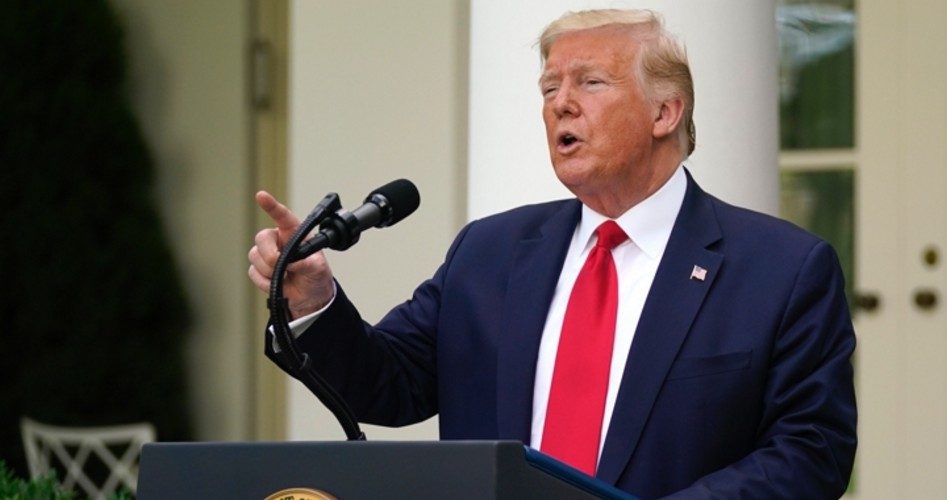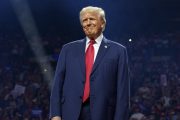
President Donald Trump is expected to sign an executive order today that may address censorship on social-media platforms. The order comes two days after the president’s favorite platform, Twitter, took the unprecedented step of adding a “fact check” to his tweets about mail-in ballots.
Twitter’s “fact checkers” included the highly biased and anti-Trump news organizations CNN and Washington Post. Trump quickly accused the social-media giant of “interfering in the 2020 Presidential Election based on fact checking by Fake News CNN and the Amazon Washington Post.” President Trump added that Twitter is “completely stifling free speech” and promised, “I, as president will not allow that to happen.”
On Wednesday, Trump hinted that he was ready to act in some way against social-media censorship in a series of tweets.
“Republicans feel that social media platforms totally silence conservative voices. We will strongly regulate them, or close them down, before we can ever allow this to happen. We saw what they attempted to do, and failed, in 2016,” the president tweeted.
Trump went on: “We can’t let a more sophisticated version of that happen again. Just like we can’t let large scale Mail-In Ballots take root in our country. It would be a free-for-all on cheating, forgery and theft of ballots. Whoever cheated the most would win. Likewise social media. Clean up your act NOW!”
Thus far, Twitter has not yet commented on the coming executive order, but the company’s CEO, Jack Dorsey, did defend Twitter’s decision to “fact check” Trump’s tweets.
“Fact check: there is someone ultimately accountable for our actions as a company, and that’s me. Please leave our employees out of this. We’ll continue to point out incorrect or disputed information about elections globally. And we will admit to any mistakes we make,” Dorsey wrote.
“This does not make us an ‘arbiter of truth.’ Our intention is to connect the dots of conflicting statements and show the information in dispute so people can judge for themselves. More transparency from us is critical so folks can clearly see the why behind our actions.”
Many believe that the executive order will be a clarification of one section of the Communications Decency Act of 1996. Under Section 230 of that law, social networks such as Twitter, Facebook, and YouTube are legally protected against content that is shared on their platforms that may be untrue. The law basically treats those companies as a utility, rather than a publisher.
But in acting to censor and “fact check” certain material, they are acting as a publisher. Thus, many believe that those protections should be removed.
“The law still protects social media companies like Twitter because they are considered forums not publishers,” said Senator Marco Rubio (R-Fla.).
“But if they have now decided to exercise an editorial role like a publisher, then they should no longer be shielded from liability and treated like publishers under the law,” Rubio concluded.
A draft of the executive order reportedly calls for the FCC to spell out what type of content blocking can be considered deceptive or out-of-step with a provider’s terms of service; a review of government advertising on social media-sites, and whether those site have a bias in placing restrictions on those ads; and the reestablishment of the White House “tech bias reporting tool,” which allows citizens to report unfair treatment by tech companies.
In addressing the controversy, Facebook CEO Mark Zuckerberg seemingly chided Twitter for its actions. “I don’t think that Facebook, or Internet platforms in general, should be arbiters of truth. I think that’s kind of a dangerous line to get down to in terms of deciding what is true and what isn’t,” Zuckerberg said.
But in a Fox News interview, set to be released today, Zuckerberg also pointed out that any action the White House takes against social media would not be the “right reflex” for a government that claims to be concerned about censorship.
Others share Zuckerberg’s apprehensison. Matthew Freeny of the Cato Institute said, “In the long run, this conservative campaign against social-media companies could have a devastating effect on the freedom of speech.”
Perhaps, instead of regulating the social-media companies to death, President Trump should try another tack. Maybe a greater message would be for Trump to dump Twitter completely and take his controversy and his 80-plus million followers to another platform, such as Gab, that is less interested in bowing to leftist pressure and more interested in allowing free speech for everyone.
Photo: AP Images
James Murphy is a freelance journalist who writes on a variety of subjects, with a primary focus on the ongoing anthropogenic climate-change hoax and cultural issues. He can be reached at [email protected]



